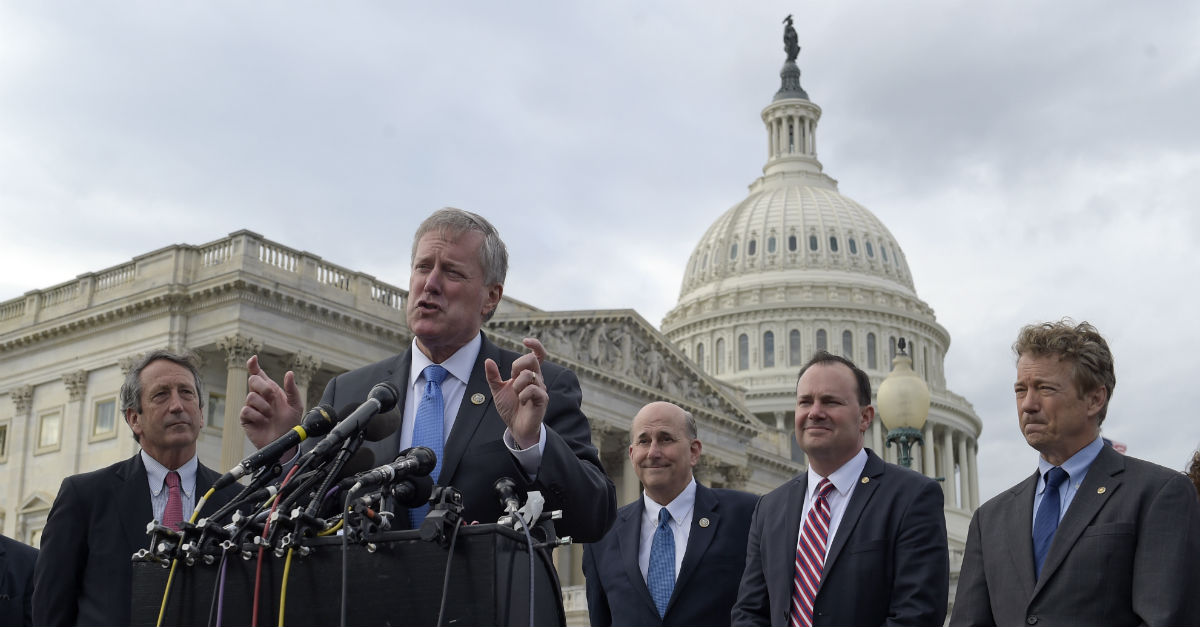Donald Trump emerged from a sort of fiscally insane Yalta Conference last week to announce that he, Chuck Schumer and Nancy Pelosi had struck a deal. Congress would be passing disaster relief funding and raising the debt ceiling for three months with no spending cuts attached. Republicans were stunned and on Friday, Treasury Secretary Steve Mnuchin and White House budget director Mick Mulvaney were dispatched to Capitol Hill to assuage the House Freedom Caucus. Subsequent reviews of their efforts have ranged from bad to “The Emoji Movie.”
Videos by Rare
Here’s Rep. Mark Walker (R-N.C.): “His performance was incredibly poor, and his last words, and I quote, were ‘vote for the debt ceiling for me’.” And Rep. Ryan Costello (R-Pa.): Mnuchin’s presentation was “about as well received as his wife’s Instagram post.” And Rep. Dave Brat (R-Mich.): “The comments from the Treasury secretary today were not helpful. I found them to be intellectually insulting.” Freedom Caucus members teased their former man Mulvaney for backing a measure he would have opposed in Congress; they panned Mnuchin for leaving the meeting early and refusing to provide a plan for the next debt ceiling battle in December.
The spending package ultimately passed, though 90 Republicans—more than a third of the House GOP—voted “no.” And while the Freedom Caucus is a minority within a majority and thus accustomed to losing legislative battles, something about this one felt different. The HFC’s initial opposition to the American Health Care Act earlier this year was intended to be alarm for Trump, but it wasn’t an official break: both sides were still ostensibly working towards the goal of repealing Obamacare. The debt ceiling sellout puts Trump and congressional conservatives on opposite sides. It suggests a difference in principle, one that’s seen Trump bubble down to the malarial depths of The Swamp rather than agree with the HFC.
RARE POV: Why Rand Paul wouldn’t have made that deal with Democrats, but Donald Trump did
As I wrote last week, it’s easy to understand how Trump arrived at his position—with three hurricanes converging on the South, he’s in no mood to deal with fiscal squabbles. The problem is that these days, every appropriations bill passes through Congress under four-alarm conditions and the next one will be no different. Democrats have shrewdly persuaded Trump to punt the next debt ceiling hike into December, and then cue the panic over ramming through that increase before the holiday break—no time to cut spending now, maybe next time around? This is how Congress works. If Trump wanted to jam its spokes, he would have done so already, or at least given conservatives an assurance that he intended to try.
The House Freedom Caucus is now in a devilish position. Many of its members were elected in scarlet districts on a platform of reining in the federal government’s excess, but many of their voters also trust Donald Trump more than the congressional GOP. That creates enough wiggle room for a potential White House-backed primary challenger should they continue to revolt, especially since their constituents are less inflamed about budgetary bloat than they were in 2010. The choice may eventually have to be made: abandon their principles or to go into opposition against yet another president.
RARE POV: No, Donald Trump was never a conventional Republican. And it’s a bit late to be crying about it
For most of these guys, that isn’t even a question: they’ve been insurgents before and they’ll do it again. So the onus then shifts onto conservative voters in their districts who must decide whether they’ll tolerate this fracture. Are they still in favor of shrinking government, as is the HFC? Or were those sepia-toned tea party protests just frivolous diversions from the real business of electing Donald Trump president? Are they now willing to follow Trump wherever he leads even if it means allying with Chuck Schumer and capitulating on the budget? Do they belong to a small-state party, a front for nationalism, a Trumpian cult of personality or something else unforeseen?
Heady questions. It’s Trump who’s forced us to this fork in the road, and early indications are that his most ardent backers are unmoved. Breitbart last Friday pushed out a slobbering panegyric hailing “the week Donald Trump saved the republic” and praising the president for restoring “the basic comity necessary for our system to function” (because if Breitbart stands for one thing, it’s comity). Rhetorical broadsides against the establishment are always more gratifying than taking it on. I don’t know what this week’s definition of “RINO” is, but “lining up with Nancy Pelosi to screw conservatives” should be put into nomination.



